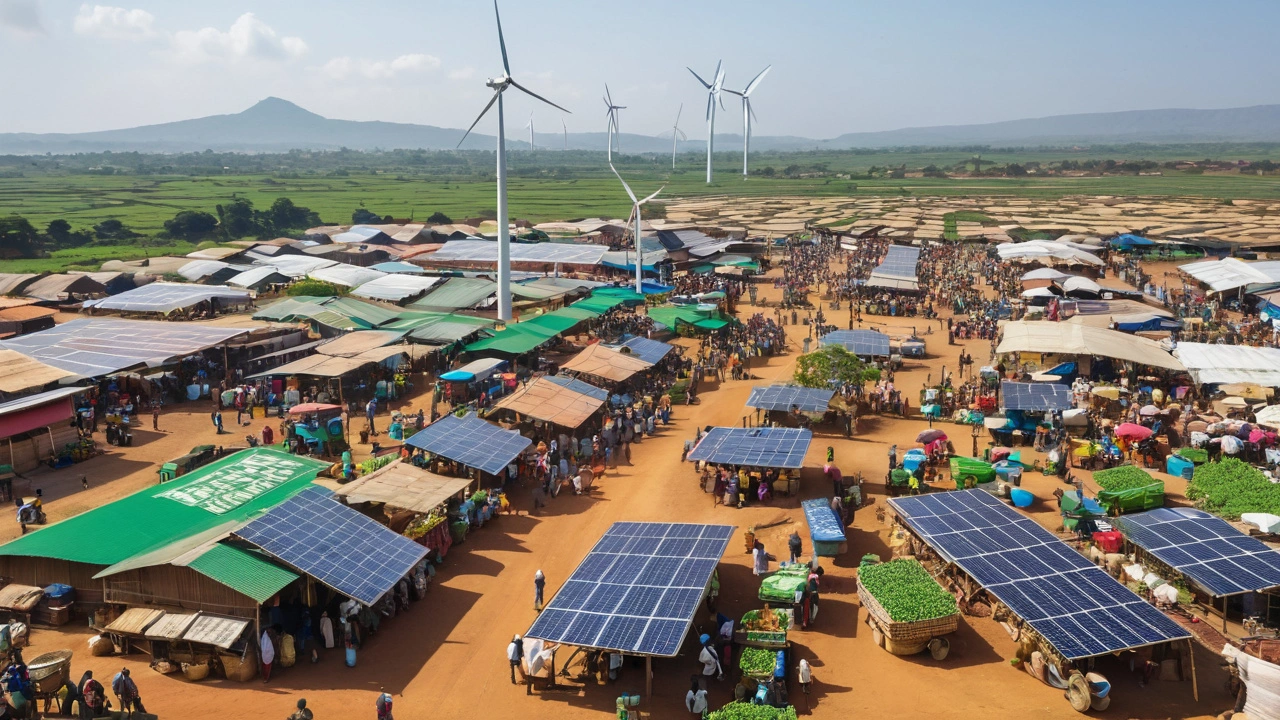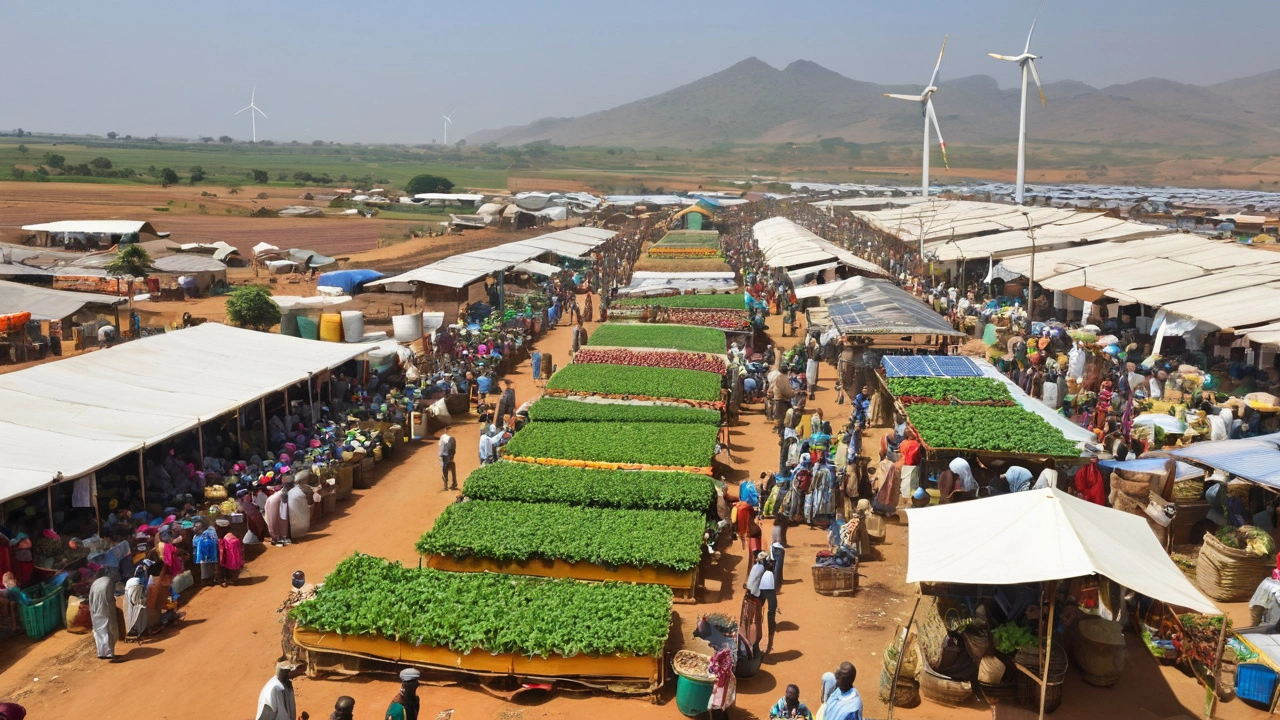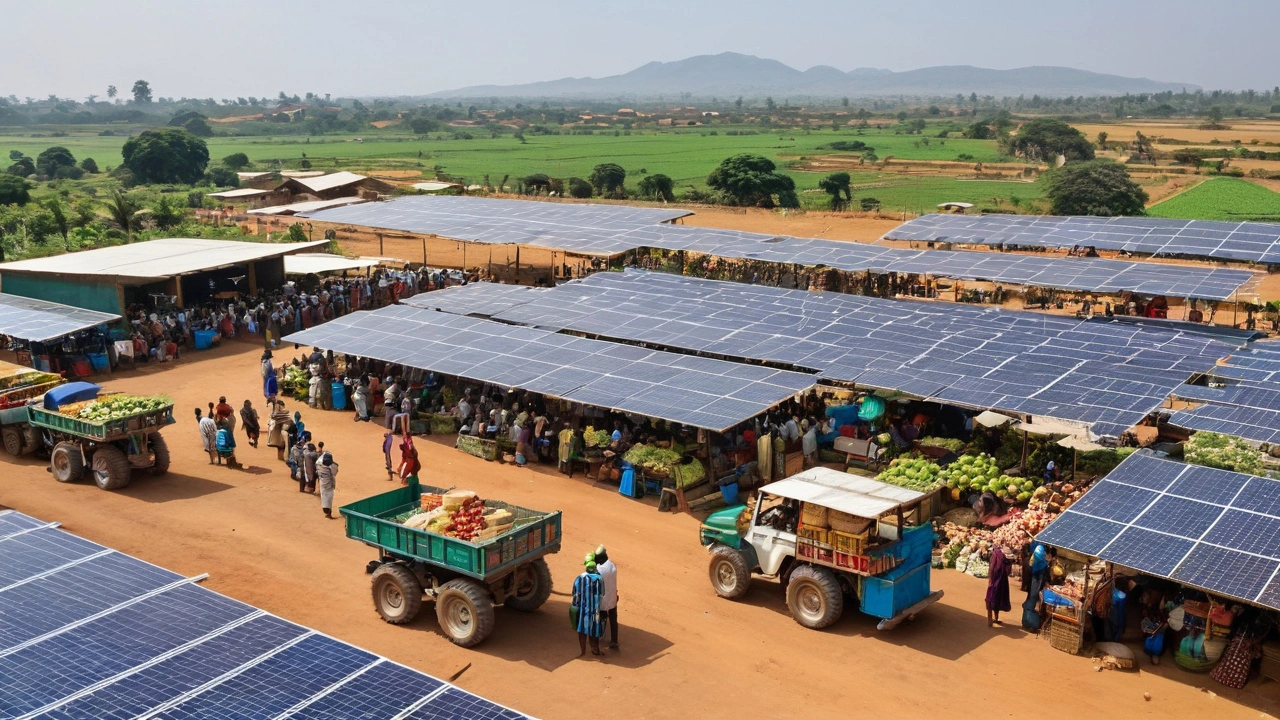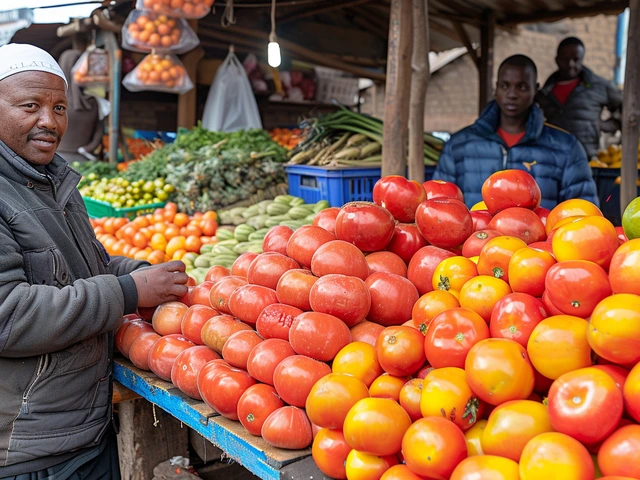Africa is buzzing with opportunities. With diverse cultures, booming populations, and rapid urbanization, the continent offers a plethora of money-making ventures.
Understanding what industries thrive can guide investors and entrepreneurs to make smart choices. Africa's dynamic landscape encompasses emerging tech hubs, rich agricultural lands, and vast natural resources. Wise investments in these sectors can lead to significant financial rewards.
- Introduction to Africa's Business Landscape
- Technology and Telecommunications
- Agriculture and Agribusiness
- Mining and Natural Resources
- Manufacturing and Consumer Goods
- Tips for Success in African Markets
Introduction to Africa's Business Landscape
Africa's business landscape is nothing short of fascinating. With 54 countries, it boasts a diverse range of cultures, economies, and opportunities. The continent, rich in natural resources, is home to some of the fastest-growing economies in the world. Nations like Nigeria, Kenya, and South Africa lead the way, driving significant economic growth which has been spurred by both local and international investments.
The technology sector is booming, with cities like Nairobi earning the nickname “Silicon Savannah” due to their growing tech scenes. Mobile technology, in particular, has seen immense success. Mobile money services like M-Pesa in Kenya have revolutionized financial transactions, bringing banking services to millions of unbanked citizens. This digital leap shows how technology can leapfrog traditional infrastructure, a significant trend in many African markets.
Agriculture remains the backbone of the continent. Africa holds 60% of the world’s uncultivated arable land, and agriculture employs about 60% of the labor force. The potential here is enormous. Improved farming techniques, better access to markets, and innovations such as drought-resistant crops could dramatically increase productivity and income. Agribusiness draws a lot of attention from investors who see the potential in feeding a growing population, both locally and globally.
Mining and natural resources have long been key industries in Africa. The continent is rich in minerals like diamonds, gold, and platinum. Countries like Botswana and South Africa have built considerable wealth from their resource industries. While this has led to economic growth, it has also sometimes resulted in economic dependencies and political tensions. Thus, diversification of the economy is a critical focus for many African nations.
Manufacturing is another sector gaining momentum. With a growing middle class, there's a rising demand for consumer goods. Companies are setting up factories to produce everything from textiles to electronics. This shift towards local manufacturing helps reduce import dependency and creates job opportunities, boosting economic stability.
Investing in Africa can be both lucrative and challenging. It requires understanding the local business environment, regulatory frameworks, and cultural nuances. Successful ventures often involve partnerships with local firms and communities. These collaborations ensure that investments are sustainable and beneficial to both investors and the local population.
“Africa is the fastest urbanizing region in the world. This rapid urbanization is synchronized with strong economic growth, driving new consumer markets.” – World Bank
Urbanization is creating new opportunities in real estate, retail, and infrastructure development. As cities expand, there's a growing need for housing, transportation, and utilities. Companies that can meet these demands stand to profit handsomely. The rise of mega-cities like Lagos, Johannesburg, and Cairo exemplifies this trend, showcasing significant investment potential.
The business landscape in Africa is dynamic and full of potential. From advancing technology to expanding agricultural capacity, there are countless opportunities for those willing to invest the time and resources. The key is to understand the unique markets and navigate the challenges with informed strategies. As the continent continues to grow economically, the prospects for business are bound to become even more promising.
Technology and Telecommunications
Africa's technology and telecommunications sector has experienced a massive boom over the past decade. The continent hosts some of the fastest-growing mobile and internet markets in the world, driven by a youthful population that is quick to adopt new technologies. Acting as a backbone for business and social activities, technology advances in Africa are not just reshaping daily life but are also becoming a primary source of economic growth.
One of the standout nations leading this charge is Nigeria, known for its burgeoning tech scene popularly referred to as 'Silicon Lagoon.' Nigeria alone saw venture capital investments exceeding $1 billion in 2023, illustrating the immense potential of the sector. South Africa and Kenya are also leaders in tech innovations with Nairobi often being crowned the 'Silicon Savannah'. These hubs are not only creating jobs but also offering solutions tailored for African problems, such as mobile money systems and health tech apps.
Mobile money, in particular, has revolutionized the payment space across Africa. Services like M-Pesa, originally launched in Kenya, have expanded into numerous countries, enabling millions to transfer money effortlessly. This increase in financial inclusion has powered small businesses, helping them grow by providing easier access to financial services. It's estimated by the GSM Association that over 400 million people in Sub-Saharan Africa are now using mobile money services.
The telecommunication infrastructure itself has come a long way. Companies like MTN, Vodafone, and Airtel have invested heavily in the region, laying down extensive fiber optic networks and increasing tower installations. As a result, internet penetration continues to grow, bridging the urban-rural digital divide. A report by the International Telecommunication Union (ITU) stated that internet penetration in Africa reached 40% in 2023, a dramatic increase from just 10% a decade earlier.
“The growth of Africa's tech scene is a testament to the ingenuity and entrepreneurial spirit of its people,” says Akinwumi Adesina, President of the African Development Bank.Technological startups like Flutterwave and Jumia have not only succeeded locally but have also attracted international attention, listing on major stock exchanges and raising significant amounts of capital. These successes highlight the import of building local solutions that can scale globally.
For entrepreneurs eyeing the African market, areas like app development, fintech, and agritech offer promising returns on investment. The need for innovative solutions tailored to local needs is immense, opening up opportunities for tech-driven startups to make meaningful impacts. The emphasis on mobile applications reflects the dominant trend of mobile-first internet users, providing fertile ground for mobile solutions.
Artificial Intelligence, too, is making inroads in different sectors, from healthcare diagnostics to agricultural optimization. Drones are now being used in countries like Rwanda to deliver medical supplies to remote areas. Such breakthrough innovations not only address critical challenges but also showcase Africa’s potential as a global tech game-changer.
Africa’s technology and telecommunications sector is set for even more remarkable growth. The continent’s young, tech-savvy population and increasing connectivity paves the way for numerous opportunities. Investors and entrepreneurs looking to tap into this market should focus on creating adaptable, problem-solving solutions tailored to African realities.

Agriculture and Agribusiness
Africa’s vast and fertile lands have made agriculture one of the most dependable and profitable ventures on the continent. From Ghana’s cocoa farms to Kenya’s tea plantations, the diversity in available crops is staggering. The agriculture sector doesn’t just address food security; it fosters economic growth and development. It employs millions, directly supporting the livelihood of over 60% of the continent’s population.
One of the remarkable aspects of agricultural opportunities in Africa is the sheer range of climates and ecosystems, allowing for the cultivation of various crops. For example, Nigeria is a giant in cassava production, while Ethiopia is one of the world’s largest producers of coffee. The continent also boasts significant production of fruits, vegetables, and grains. This diversity opens the door to numerous agribusiness ventures, from small-scale organic farming to large-scale commercial farming.
The potential for agribusiness extends beyond just growing crops. There's also enormous value in processing these raw materials into finished goods. Agro-processing industries add significant value by transforming basic agricultural products into items like fruit juices, canned vegetables, and cocoa-based products. This value addition not only increases profit margins but also creates jobs and stimulates local economies.
African governments are becoming increasingly supportive of the agriculture sector. Many have initiated policies aimed at boosting agricultural productivity and sustainability. For example, Rwanda’s Green Revolution has made significant strides in increasing crop yields and incomes for farmers. Investments in modern farming technologies and practices, such as irrigation systems and high-yield seed varieties, are further enhancing the sector’s potential.
The advent of digital technology is also revolutionizing African agriculture. Mobile technology, in particular, has altered how African farmers operate. Platforms like iCow in Kenya provide farmers with vital information about breeding, feeding, and disease management. Similarly, Nigeria's FarmCrowdy connects small-scale farmers with investors, offering financial and technical support. These initiatives are enhancing farming efficiency and output considerably.
As the African Development Bank highlights, “Agriculture is Africa’s most important sector, providing employment to nearly two-thirds of the continent’s working population.”
Investment opportunities in agriculture are broad and varied. High-potential areas include organic farming, food processing, and aquaculture. Investing in sustainable farming practices not only promises good returns but also contributes to environmental conservation. The demand for organic and sustainably grown products is on the rise, both locally and internationally.
For those interested in agribusiness, starting small with a focus on a niche market can be a wise move. Identifying a product with strong local demand, or one that can be easily exported, can provide a solid foundation for growth. As the business grows, diversifying into related areas, such as agro-processing or distribution, can amplify profits and business sustainability.
To sum up, agriculture and agribusiness in Africa offer a wealth of opportunities. The sector's resilience, growth potential, and critical role in the economy make it an attractive area for investment. With supportive government policies, technological advancements, and a growing global demand for unique, high-quality African products, the future looks exceedingly bright for those who choose to invest in this vital sector.
Mining and Natural Resources
Mining and natural resources are the bread and butter for many African economies. Countries like South Africa, Nigeria, and Ghana boast some of the richest natural reserves in the world, from gold and diamonds to oil and gas. These resources not only bring in massive revenues but also offer plentiful job opportunities. It's no wonder the mining industry thrives here.
Let's take gold, for instance. Ghana is the largest gold producer in Africa and sixth in the world. Gold mining has evolved into a significant part of the country’s economy. Investments in technology have improved the efficiency of extraction and processing, leading to higher yields and better profits. In fact, it’s been estimated that the gold mining industry provides around 5% of Ghana's GDP.
Similarly, South Africa is famous for its diamond mines. The country has been a treasure chest for over a century. Kimberley, well known as the diamond capital of the world, has been the epicenter of diamond mining operations. These sparkling stones have not just made South Africa rich but also renowned globally.
The oil sector is another big player. Nigeria is the largest oil producer in Africa, contributing significantly to its national and international income. The petroleum industry has faced its share of challenges, but the rewards remain lucrative. Oil revenues have propelled countries like Nigeria into economic powerhouses within the continent.
Natural gas is also gaining traction. In Mozambique, the discovery of large gas reserves has turned the tide. The country is now looking at a future where it doesn't just export raw gas but also benefits from associated industries producing liquified natural gas (LNG). The potential for economic transformation here is immense.
“The exploitation of natural resources such as minerals and oil has a direct and profound impact on the economies and livelihoods of African nations,” says Dr. Ernest Kwame, an expert in African economic development.
But it's not all about extraction. Environmental responsibility is now a crucial part of the industry. Companies are investing in sustainable mining practices to minimize environmental impact. Reclamation projects are undertaken to restore land used for mining. In this era of climate change, being an environmentally responsible business is not just good for morale but also attracts more investors.
There's also growing interest in less well-known but equally valuable minerals like cobalt and lithium. These are essential for the tech industry, particularly for batteries and electronic gadgets. Countries like the Democratic Republic of Congo hold significant reserves of cobalt. With the global shift towards electric vehicles, these resources are becoming increasingly valuable.
In a nutshell, mining and natural resources remain pivotal to Africa's economic prosperity. They offer vast opportunities, albeit with their set of challenges. Regions rich in minerals and oil have the chance to transform their economies, provided they manage these resources responsibly. With advancements in tech and a focus on sustainability, the future of mining in Africa looks promising.

Manufacturing and Consumer Goods
Manufacturing and consumer goods are two pillars that drive Africa's economic engine. As countries on the continent grow economically, the demand for consumer goods surges, presenting lucrative opportunities for businesses. The diversity in consumer needs, ranging from food products to electronics, paints a broad canvas for investors to explore.
A significant trend in manufacturing is the localization of production. Many international brands have set up factories in Africa to cater to the growing middle class. This reduces import costs and meets the region's unique market demands. For instance, companies like Nestlé and Unilever produce household staples within Africa, which has not only bolstered their profitability but also created jobs.
Small and medium enterprises (SMEs) are also making a mark. These businesses contribute vastly to job creation and the local economy. According to the World Bank, SMEs account for 40% of GDP in emerging economies. They produce a variety of goods, from fashion apparel to beauty products, tailored to meet local tastes and preferences.
Agro-processing, which transforms agricultural commodities into consumable products, stands out as a key sub-sector. Local processing of raw materials like coffee, cocoa, and fruits adds value and revenue. Companies engaged in agro-processing not only tap into export markets but also fill local supply gaps. As a result, agro-processing holds substantial growth potential, given Africa’s agricultural abundance.
The growth of e-commerce platforms has enabled the consumer goods sector to thrive. With greater internet penetration, platforms like Jumia and Konga are expanding their reach. They provide a direct route for manufacturers to sell their products to a vast customer base. The convenience of online shopping has resonated with many, driving an increase in sales volumes. Reports state that e-commerce in Africa was valued at over $16 billion in 2020 and is set to continue growing.
"Africa is the next great growth market. It has primary appeal based on its economic size and its demographic characteristics." - McKinsey & Company
Promoting local brands has also become a trend among African consumers. There is a sense of pride in purchasing locally made goods, which boosts the domestic market. Brands that incorporate local culture, design, and ingredients are gaining popularity. This shift supports the growth of home-grown businesses, fueling the manufacturing sector’s expansion.
Infrastructure development plays an essential role in sustaining the growth of manufacturing. Improved roads, power supply, and logistics make it easier to produce and distribute goods efficiently. Many African governments are investing heavily in infrastructure to attract more manufacturers to their regions. These investments lay the groundwork for a thriving manufacturing environment.
However, challenges exist. Manufacturers often grapple with issues like power outages, supply chain disruptions, and regulatory hurdles. Overcoming these obstacles requires innovative solutions and support from both public and private sectors. Public-private partnerships can provide the necessary framework for resolving these issues and fostering a conducive business climate.
In conclusion, the manufacturing and consumer goods sectors offer tremendous earning potential in Africa. By understanding market dynamics, leveraging local resources, and adapting to evolving consumer preferences, businesses can carve out successful ventures. The mix of growing consumer demand, supportive policies, and increasing investments makes Africa a promising destination for manufacturing enterprises.
Tips for Success in African Markets
Entering the African market can be a rewarding venture if approached strategically. First off, understanding the local market conditions is crucial. The markets in Africa are varied, with unique consumer demands and preferences. To succeed, one must invest time in researching local customs, habits, and economic climates. Partnering with local businesses or hiring locals can provide valuable insights that are hard to come by otherwise.
One major factor to consider is the regulatory environment. Governments across Africa have different laws and regulations that foreign businesses must comply with. It's important to stay updated on these regulations and perhaps hire legal advisors who specialize in African markets. Establishing good relationships with local officials can also ease regulatory hurdles.
Africa’s infrastructure can be hit or miss depending on the region. Urban centers like Lagos, Nairobi, and Johannesburg are well developed, but rural areas may have limited access to necessary facilities. Logistics can be a challenge, so it’s wise to plan your supply chain carefully. Delivery times, warehousing, and transportation costs should be factored into your business model.
Adapting products to fit local needs is another vital tip. The one-size-fits-all approach seldom works here. For example, mobile payment systems like M-Pesa have thrived in Kenya because they address a need specific to the Kenyan market. Tailoring your product or service to solve local problems can improve acceptance and drive sales.
Financial inclusion is growing, but many consumers still lack access to traditional banking. Mobile banking and digital payment solutions have helped bridge this gap. Offering various payment options can attract a broader customer base. Ensuring that your payment processes are secure will build trust with your customers.
Marketing strategies also need to be localized. What works in one African country might not work in another. Messaging should resonate with local cultures and societal values. Social media is a powerful tool for marketing in Africa, especially platforms like Facebook and WhatsApp, which have millions of active users on the continent.
Building Trust and Establishing a Brand
Trust is fundamental in any business, and it’s no different in African markets. Building a brand that symbolizes reliability and quality can take time but is essential for long-term success. Transparency in your dealings and consistency in product quality can help cement your reputation. Engaging with the community through Corporate Social Responsibility (CSR) initiatives can also enhance your brand image.
"Africa is not a country, and each nation offers unique opportunities and challenges. Adaptability and understanding are key to thriving here," says Mwangi Kimenyi, a Senior Research Fellow at the Brookings Institution.
Finally, be patient and persistent. Entering a new market is rarely a swift process. The rewards are there for those who are willing to invest the time and resources. With the right approach, tapping into the vibrant and growing African economy can be extremely lucrative.
Leveraging Technology
Technology can be an enormous enabler in African markets. With mobile phone penetration rates soaring, businesses that leverage mobile platforms can reach a wide audience quickly. E-commerce platforms are growing, enabling businesses to bypass traditional retail challenges. Consider investing in robust IT infrastructure to support your operations.
Local partnerships often provide the fastest path to success. Collaborating with local tech firms or utilizing local knowledge can offer solutions that may not be visible from an outsider’s perspective. Leveraging technology to streamline operations, enhance customer experiences, and drive sales can make a significant difference in your success trajectory.

 Top Occupations in High Demand for 2024
Top Occupations in High Demand for 2024
 How Foreigners Can Own and Start a Business in Ethiopia
How Foreigners Can Own and Start a Business in Ethiopia
 Investing In Ethiopia: How Much Do You Really Need?
Investing In Ethiopia: How Much Do You Really Need?
 Navigating Employment Opportunities for Foreigners in Ethiopia
Navigating Employment Opportunities for Foreigners in Ethiopia
 Understanding the Average Salary in Ethiopia: An In-depth Analysis
Understanding the Average Salary in Ethiopia: An In-depth Analysis
Larry Keaton
August 12, 2024 AT 19:44Hey folks, let’s cut the fluff and talk real money‑makers in Africa. First up, tech hubs are exploding – Nairobi, Lagos, Cape Town are buzzing like beehives, and if you ain’t in on mobile payments you’re missing out. M‑Pay platforms turned cash‑poor markets into cash‑rich ones overnight, and investors are spraying cash like confetti. Then there’s agriculture – 60% of the labor force, endless arable land, and a hungry continent that’s still under‑served. Think of value‑add: turning raw cocoa into premium chocolate bars, or processing coffee beans locally instead of shipping green beans out. Mining? Yeah, gold, diamonds, cobalt – the stuff that fuels everything from phones to electric car batteries. Ghana’s gold rush is still growing and DR‑Congo’s cobalt is the new black gold. Manufacturing is catching up too, with factories popping up to serve the growing middle class, so you’re not just importing, you’re producing at home. Real estate in megacities like Lagos is a gold mine if you can handle the bureaucracy. And don’t forget renewable energy – solar farms are sprouting faster than you can say “grid”. The key is partnerships: you need a local ally who knows the terrain, the regs, and the people. Infrastructure is still a pain point, but governments are finally spending on roads and power, so the logistics puzzle is getting easier. Mobile internet penetration is now at 40%, meaning e‑commerce can finally thrive beyond the big cities. If you stack tech, agri, mining, and manufacturing together, you create a diversified portfolio that can ride any market wave. Bottom line: Africa isn’t a single market, it’s a continent of opportunities – grab a slice before everyone else does.
Liliana Carranza
August 23, 2024 AT 08:39Wow, this rundown is super energizing! 🌟 The way you highlighted each sector makes me want to dive right in. Tech is definitely the heartbeat of the continent right now, and those mobile money successes are pure inspiration. Agriculture’s potential is massive – picture vibrant farms feeding not just locals but exporting premium products worldwide. Mining and renewable energy go hand‑in‑hand, giving both profit and sustainability. I love the emphasis on local partnerships; they’re the bridge between vision and reality. Keep the momentum going, and let’s watch Africa’s growth skyrocket together!
Jeff Byrd
September 2, 2024 AT 21:35Oh sure, because every investor just loves navigating a maze of red tape and power cuts. The “buzz” you mention feels more like hype if you ignore the on‑the‑ground challenges. Mobile money is great until your network goes down and you’re stuck with a dead phone. And let’s not pretend that African governments are suddenly all efficient – corruption still haunts many projects. So yeah, there’s money, but only for those who can dodge the endless obstacles.
Joel Watson
September 13, 2024 AT 10:30One must acknowledge, with an air of dispassionate precision, that the allure of African ventures is often overstated by optimistic marketing. While technological hubs indeed proliferate, their scalability remains constrained by infrastructural deficits. Agricultural endeavors, albeit substantial, suffer from chronic underinvestment in agronomic research. Likewise, the mining sector’s profitability is intrinsically linked to volatile commodity prices, which are beyond any entrepreneur’s control. In sum, expectations must be tempered by rigorous analysis.
Chirag P
September 23, 2024 AT 23:25Thank you for sharing this comprehensive overview. I appreciate the balanced view of both opportunities and challenges across sectors. The emphasis on cultural nuances and the need for respectful local partnerships resonates strongly. It’s clear that success will require both strategic insight and genuine collaboration with regional stakeholders.
RUBEN INGA NUÑEZ
October 4, 2024 AT 12:21While your enthusiasm is commendable, let’s clarify a few points. Mobile money adoption rates, though impressive, still vary widely between countries; blanket statements can mislead investors. Moreover, agricultural value‑addition requires substantial capital for processing facilities, which many smallholders cannot afford without clear financing structures. Precision in these details is essential for realistic planning.
Michelle Warren
October 15, 2024 AT 01:16this is all toobla bla bla i cant even read these bigword a lot of hype and no real info maybe its just a fad who knows
Christopher Boles
October 25, 2024 AT 14:12Great summary, very helpful.
Crystal Novotny
November 5, 2024 AT 02:07One might argue that the true profit lies not in the obvious sectors but in the overlooked niches that escape mainstream analysis. Yet, without empirical evidence, such musings remain speculative at best.
Reagan Traphagen
November 15, 2024 AT 15:02Notice how every optimistic report conveniently omits the hidden hand that pulls the strings: the elite banking consortium that benefits from every so‑called "investment". Their influence skews data, ensuring only their interests prosper while local economies stay shackled.
mark sweeney
November 26, 2024 AT 03:58Honestly, the hype around "Silicon Savannah" is just a marketing gimmick. Real tech growth only happens where there’s genuine demand, not just cheap labor and cheap servers.
randy mcgrath
December 6, 2024 AT 16:53Considering the arguments presented, one could reflect on the nature of risk and reward. It seems that the pursuit of profit often mirrors philosophical quests: both require patience, insight, and a willingness to confront uncertainty.
Frankie Mobley
December 17, 2024 AT 05:49If you’re looking for practical steps, start by identifying local incubators that support startups in your target sector. They often provide mentorship, funding connections, and regulatory guidance that can accelerate entry into the market.
ashli john
December 27, 2024 AT 18:44Really encouraging how each sector has its own vibe and growth path just remember to stay patient and keep learning from the local teams they know the ground best